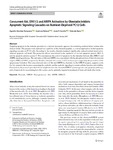Concurrent Akt, ERK1/2 and AMPK Activation by Obestatin Inhibits Apoptotic Signaling Cascades on Nutrient-Deprived PC12 Cells

View/
Use this link to cite
http://hdl.handle.net/2183/41229Collections
- Investigación (FCIE) [1240]
Metadata
Show full item recordTitle
Concurrent Akt, ERK1/2 and AMPK Activation by Obestatin Inhibits Apoptotic Signaling Cascades on Nutrient-Deprived PC12 CellsAuthor(s)
Date
2021-01-05Citation
Sánchez-Temprano, A., Relova, J.L., Camiña, J.P. et al. Concurrent Akt, ERK1/2 and AMPK Activation by Obestatin Inhibits Apoptotic Signaling Cascades on Nutrient-Deprived PC12 Cells. Cell Mol Neurobiol 42, 1607–1614 (2022). https://doi.org/10.1007/s10571-020-01025-8
Abstract
[Abstract] Targeting apoptosis in the ischemic penumbra is a rational therapeutic approach for restricting cerebral infarct volume after clinical stroke. The present work explored the capability of the obestatin peptide, as a novel approach to inhibit apoptotic signaling cascades on PC12 cells. According to the results, obestatin treatment significantly reduced nutrient deprivation-induced apoptotic cell death. The protective effects were related to the regulation of the anti-apoptotic protein, BCL-2, and the apoptotic protein caspase-3. This encompasses the control of apoptosis by the interplay between Akt, ERK1/2 and AMPK signaling pathways. The activation of Akt and AMPK was concomitant with the phosphorylation of their downstream targets, GSK3 and ACC, respectively. Besides, obestatin also causes FoxO1 nuclear export supporting the prevention of the apoptosome formation. The concurrent activation of Akt and AMPK by obestatin via the GPR39 receptor, supports a role for this system in the balance concerning the catabolic and the anabolic signaling to sustain cellular function and viability. Furthermore, these results provide both an insight into how the obestatin/GPR39 system regulates anti-apoptotic pathways, and a framework for ascertaining how this system can be optimally targeted in treatment of brain cell death after stroke.
Keywords
Obestatin
GPR39
Neuroprotection
Akt
AMPK
ERK1/2
GPR39
Neuroprotection
Akt
AMPK
ERK1/2
Editor version
Rights
Atribución 4.0 Internacional
ISSN
1573-6830






